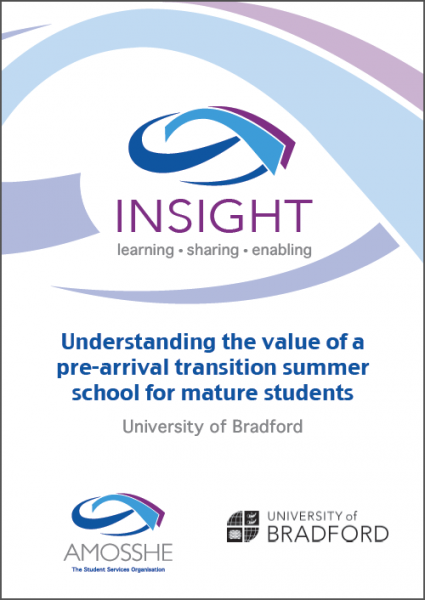|
Aims and objectivesEvidence from the sector often highlights the importance of student engagement and successful transition, but it is less clear how particular support opportunities affect the individuals that are involved. Therefore this project aims to understand the value of participating in the ‘trans:it summer school’ from the student perspective. The project takes a mixed, but largely qualitative, approach to ascertain the regard, importance, worth, or usefulness that the summer school experience is held to deserve. The work strives to obtain student articulations of their experiences and to identify key strengths and any areas of good practice for transition summer schools. Similarly, the project also explores other developments that could be made regarding transition, both for internal activity at Bradford and wider higher education sector practice. Overall, the project team aims to ascertain the value of the summer school to new mature students and to capture its role in their early and ongoing transitions through university. MethodologyThe project aims to take a small scale, empirical, multi-method approach by undertaking the following activities:
The project will be led by an experienced researcher in the field of the student experience and, in particular, running questionnaires, interviews, and analysing such data. The project lead and team also have experience of running evaluations of practice initiatives. However, a key part of the overall methodology will be to involve students in the research design, collection and analysis – as well as being the research subjects. At least one student research intern will work alongside the project lead. Therefore the research will be participatory in design and focus, and will also offer an employability opportunity to the student body. Literature reviewThe first stage of the project will be a literature review in the area of transition support into higher education. It will look for examples of schemes or initiatives across the higher education sector, evidence of the value and impact of these, and broader literature on successful transitions. This will enable the project to be placed in the context of wider sector work into student retention and success. QuestionnaireThe literature review will be followed by an online questionnaire (using Bristol Online Surveys) to obtain largely quantitative data from the group of 2014 participants. The questionnaire will include ratings of each element of the summer school and the extent to which it helped students prepare for starting university and to feel more confident about starting their studies. However, the questionnaire will also include open as well as closed questions to enable students to express views in their own words and make suggestions for improvement. The questionnaire will be sent to all 148 participants of the 2014 summer school and will also be used to generate interest in and recruit participants for the interviews. In depth interviewsUnderpinned by the wider literature and the questionnaire data, a qualitative exploration of a sample of the participants will then take place. This will aim to uncover individual experiences of pre-arrival transition support and to explore this in depth to reveal perspectives, expectations and suggestions. It will strive to hear the authentic voice and lived experience of individual students, who have situated knowledge and experience of mature student transition into higher education. Semi-structured interviews will offer an individual reflective approach that examines in detail the particular transition experiences, including their circumstances and views, as well as encouraging participants to suggest ideas for change, or other support that could aid transition. The project team feels that this method is most appropriate for allowing participants to articulate and reflect on their own perspectives, to raise what is of importance to them, and to highlight matters or insights that may not have been considered. It could also reveal possible conflict and contradictions in beliefs, both between and within accounts, and therefore offer a more nuanced understanding of student transition. By offering the opportunity for reflection, the project aims to be participatory in its approach, and enables participant involvement in the production of knowledge. It is also particularly suitable for reflective accounts of journeys into university as participants can take control and have a sense of ownership over what they discuss. This interpretive exploration is interested in commonalties and intends to pull out emergent themes. However, the interview findings are not intended to be representative or enable generalisations to be made of all mature students. Instead, they aim to offer more detail within the wider context of the questionnaire data and literature review. Due to the nature of the research and the desired subjects, the project will utilise a purposive sample for the interviews and will encourage a range of volunteers from different backgrounds where possible. Incentives for participation (such as book tokens) will be offered. Potential issues and problems in conducting this research may occur in recruiting an adequate number of participants for interview, and therefore sampling may have to be revised. However, as the sample does not aim to be representative, possible limitations regarding the range of participants will only be reflected upon in the reported findings. Ethical issuesEthical issues concerning data collection, storage and presentation will be addressed. All questionnaire respondents and interviewees will be anonymous. Exploring personal reflections may result in individuals feeling vulnerable and therefore confidentiality will be upheld. Referral contact(s) will also be offered for those who wish to seek further support on any of the issues raised. Informed consent will be sought prior to the interviews and participants given the opportunity to withdraw from the research prior to analysis and publication. The project team will ensure that all information is clear and that they are open about the research aims. Staff and student researchers may also impact upon the research due to their role in the delivery of the ‘trans:it summer school’ or as students at the institution who also have a transition experience. This will be noted in the project design and reflected upon in the findings as appropriate. All student researchers will receive training in research methods, effective interviewing skills and qualitative data analysis. Throughout the research the project team will reflect critically on the process, any difficulties or unexpected issues. Regular team meetings will be held to assess progress and direction and monthly progress updates provided. Data analysisInterview data will be recorded / transcribed and thematic analysis used to outline and explore themes, patterns, links and concepts as interpreted from the data and using examples and quotes from the research subjects. These will be used alongside the key questionnaire trends to gain an overview of mature student transition and the effect of participating in the ‘trans:it summer school’. Intended outputsThe project aims to produce the following:
As well as sharing the project outcomes through AMOSSHE, the project team will also share them through:
Students will be encouraged to take part in dissemination activities. |


 Total award from AMOSSHE: £2,550.
Total award from AMOSSHE: £2,550.